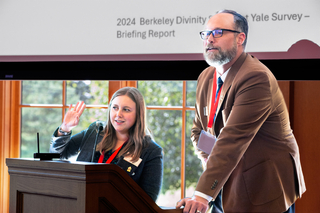Survey says...

Hannah Black and Jonathan Taylor present survey data to the Graduate Network at Convocation 2024
2024 Survey Findings
The 2024 survey, generously conducted by Customer Care Measurement & Consulting, provided key insights into people’s relationships with Berkeley, views on the Episcopal Church, and needs that Berkeley can meet. The majority of respondents feel connected to and positive about Berkeley at Yale. 83% reported that they are likely to recommend that a prospective student attend Berkeley. The survey gathered responses from 474 participants, offering a robust sample with an extraordinary response rate. Berkeley is deeply grateful for respondents’ generosity of time.
Where are they now?
77% of the responses were from graduates of Berkeley, and 40% of those graduates identified themselves as rectors or priests in charge. 15% of graduates who took the survey work outside the church.
Town Halls
Only 35% of graduates have attended Graduate Network Town Halls, and those who have attended Town Halls are twice as likely to feel connected to Berkeley. When asked what they would like to see at Town Halls, 66% of graduates gave the answer updates from the Quad. 46% of respondents want ways to connect with other graduates. 38% want advice or inspiration with short case studies. The Rev’d Dr. Andy Barnett, President of the Graduate Network, is working hard to put together a great year of Town Halls with this feedback in mind. The next Town Halls will be Thursday, February 20 at 5 pm Eastern and Thursday, May 22 at 5 pm Eastern.
Faculty Teaching and Research
All categories of respondents expressed a high interest level in current teaching and publishing by faculty. Bishops (57%), lay leaders (51%), and associate priests (50%) showed particular interest. In response, BDS will continue to publish new research in the Ex Libris section of the biannual Berkeley at Yale magazine. The Leader’s Way Podcast hosts will look to prioritize highlighting faculty teaching and research as part of the show, available on Berkeley’s website, podcast apps, and YouTube.
Social Media Engagement
A substantial number of community members (35%-48%) spend time on Facebook and YouTube. This highlights the importance of these platforms in maintaining and enhancing communication with the wider BDS community. In response, The Leader’s Way Podcast has made its way beyond podcasting platforms to YouTube. Berkeley has expanded its social media presence beyond Facebook, Instagram, and X to include not only YouTube but also LinkedIn and TikTok after learning how meaningful online engagement is in creating connection with its community members.
Preferred Communication Channels
The survey revealed a strong preference for printed magazines over a hypothetical online version. 79% of people who receive the magazine read it. However, email newsletters remain the top choice for receiving updates from Berkeley at Yale. Therefore, Berkeley will continue on its current trajectory, emailing monthly news updates.
Mentorship and Regional Events
Mentoring opportunities and participation in regional events emerged as primary areas of interest for respondents looking to develop a deeper connection with BDS. More than half (53%) expressed openness to further discussions, signaling a potential for sustained engagement efforts. Berkeley staff is now turning its attention to this follow up step. Transforming Leaders staff are considering how a mentoring program might fit into its mission, while advancement staff are considering how best to utilize Graduate Network volunteers to foster community through regional events.
Issues Facing the Church and Continuing Education Needs
Respondents reported that the top three issues facing the church are
- Declining attendance
- The need to nurture spiritual growth
- Future leadership
When asked about continuing education, respondents were most interested in learning about
- Organizational leadership
- Prayer, contemplation, spiritual formation, and personal wellness
- Financial stewardship
- Preaching
- Bible, history, and theology
The Episcopal Church and Implications
Despite the issues and needs facing our church and clergy, 57% of respondents described themselves as optimistic about the future of the Episcopal Church. Only 25% described themselves as pessimistic. Respondents listed the greatest weaknesses of the Episcopal Church as bandwagon politics, evangelism, and lack of authenticity in worship and preaching. The greatest strengths were liturgy and keeping traditional theology.
Overall, the survey findings provide BDS with valuable insights that will shape future initiatives and strategies, ensuring that the institution continues to meet the evolving needs and expectations of its community.